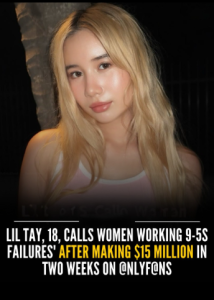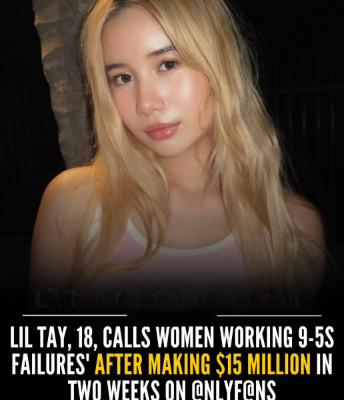


Lil Tay Sparks Controversy: The 18-Year-Old Calls 9–5 Women “Failures” After Alleged $15 Million OnlyFans Payday
The online world was thrown into a frenzy when Lil Tay, now 18 years old, made headlines for a controversial statement that lit up social media platforms across the globe. The former child influencer, who rose to viral fame for her brash persona and luxury lifestyle, has once again sparked debate—this time for comments she made after claiming to earn $15 million in just two weeks through OnlyFans.
The young internet star called women who work regular 9–5 jobs “failures,” a remark that many have labeled disrespectful, tone-deaf, and divisive. But others argue she’s simply living out her brand: loud, unfiltered, and unapologetic.
A Shocking Statement That Went Viral
The controversy began when Lil Tay posted a bold message on her social media accounts, accompanied by a photo of herself posing in a lavish mansion, dressed in designer clothing, and surrounded by luxury cars.
“If you’re still working a 9–5 as a woman in 2025, you’re failing at life. I made $15 million in two weeks just being me. No alarm clocks. No boss. Just power,” she wrote.
Within hours, her post was shared tens of thousands of times, sparking heated debates in the comments. Some called her “a genius at self-promotion,” while others accused her of “insulting hard-working women” who support themselves and their families through traditional jobs.
From Viral Child to Controversial Adult
Lil Tay’s story is unlike that of many influencers. She first gained global attention at just nine years old for posting videos in which she flaunted stacks of cash, luxury cars, and high-end fashion. Her exaggerated “flexing” and foul-mouthed rants turned her into a controversial figure almost overnight.
But behind the scenes, there were family struggles, legal battles, and allegations of exploitation. For a time, she disappeared from the spotlight, leaving fans wondering what had happened to the “youngest flexer of the century.”
When she turned 18 earlier this year, Lil Tay made a dramatic comeback. Her return to social media was carefully orchestrated, with cryptic posts, luxury photoshoots, and teasers about “taking back her empire.” Then came the announcement of her joining OnlyFans—a platform known for its subscription-based content model that has made several influencers millionaires.
The $15 Million Claim
Lil Tay claimed that within two weeks of launching her OnlyFans account, she earned more than $15 million through subscriptions, tips, and pay-per-view content.
Although these earnings have not been publicly verified, her claim aligns with reports of other high-profile influencers making large sums on the platform. For example, creators like Bhad Bhabie and Bella Thorne made millions in their first weeks as well.
Lil Tay framed her success as proof of “being smart, not working hard,” a phrase that became both a rallying cry for her supporters and a point of anger for critics.
Backlash from Working Women
The harshest criticism came from women working traditional jobs. Many felt Lil Tay’s words were not just arrogant but dismissive of the everyday struggles women face.
One viral comment read:
“Calling women ‘failures’ because they don’t make millions online isn’t empowering. It’s cruel. Some of us work 9–5 jobs to feed our kids, pay rent, and build a better future.”
Others pointed out that not everyone has the privilege, looks, or online following to make millions on subscription platforms. For many, a stable job is not a failure but a lifeline.
Defenders Say She’s ‘Just Playing the Game’
However, Lil Tay’s supporters rushed to defend her. Many argued that she’s simply capitalizing on a system that rewards viral personalities and savvy self-marketing. They say she’s not mocking workers but highlighting the changing nature of work in a digital age.
A popular influencer commented:
“Lil Tay didn’t create the world where influencers make millions. She just learned how to dominate it. If anything, she’s showing how fast the game has changed.”
To them, her success is a symbol of how unconventional paths—particularly for young women—can lead to financial independence, even if it offends traditional values.
The Power and Peril of Digital Fame
This situation reveals a larger truth: the meaning of success has shifted dramatically in the past decade. Not long ago, a “good job” meant a steady paycheck, benefits, and a retirement plan. But in 2025, digital platforms can turn someone into a millionaire overnight—or ruin their reputation just as fast.
Lil Tay’s rise and fall—and rise again—mirror this new era. She built her brand on controversy, went quiet during legal and personal battles, and then returned with an even louder statement. Her words, while polarizing, are designed to keep people talking about her. And it works.
Every like, comment, and share adds to her visibility, which in turn fuels her online empire.
The Gender Debate
Lil Tay’s statement also ignited an intense gender debate. Many critics argue that women already face enough judgment—about their bodies, choices, and careers—and Lil Tay’s comment adds unnecessary division.
Some feminists pointed out that labeling women who work traditional jobs as “failures” undermines women who are breaking barriers in corporate, academic, and service fields. They argue that success should not be defined by wealth alone, but by freedom, dignity, and self-determination.
Others, however, saw her statement as a twisted form of empowerment. She’s asserting that women don’t need to conform to traditional roles or rely on others for financial support. Even if the delivery was harsh, they believe the message taps into a growing cultural shift toward financial autonomy for women.
The Role of OnlyFans and Online Wealth
OnlyFans has played a massive role in this cultural shift. Launched as a general content platform, it became synonymous with adult content and personal branding. Many women use it to earn money directly from their fans, bypassing traditional industries that often exploit or underpay them.
But this model also raises questions about who gets to succeed. Influencers with large followings, striking appearances, or controversy-driven brands can make millions, while most creators earn modest amounts. The gap between top earners and average users mirrors the inequalities found in other industries.
Lil Tay’s $15 million claim has drawn renewed attention to this divide.
A Carefully Crafted Persona
Those who have followed Lil Tay from the beginning recognize that controversy has always been part of her strategy. At nine years old, she insulted celebrities, called herself the richest kid online, and displayed wealth that shocked audiences.
Now, at 18, she’s doing the same thing—but on a platform that directly turns attention into cash. She understands that shock value equals virality, and virality equals revenue.
Experts in influencer marketing have noted that statements like hers are rarely spontaneous. They are planned moves designed to spark conversation, drive engagement, and increase subscriptions.
Society’s Obsession with Fast Wealth
Lil Tay’s comments also reflect a broader cultural trend: society’s fascination with getting rich quickly. From crypto booms to influencer fame, many young people are turning away from traditional career paths in search of instant wealth and freedom.
This mindset isn’t new, but social media amplifies it like never before. Seeing an 18-year-old flaunt millions earned in two weeks can be both inspiring and frustrating for people who work tirelessly every day.
Where Lil Tay Goes from Here
It remains to be seen how long this new chapter of Lil Tay’s career will last. Fame built on controversy can be powerful but unstable. While her $15 million claim has made her one of the most talked-about figures of the moment, it has also placed a target on her back.
Critics are scrutinizing her statements, financial claims, and personal ethics. Meanwhile, her fanbase continues to grow—especially among those who view her as a rebellious figure who refuses to follow the rules.
Conclusion: A Divided Audience, A Defining Moment
Lil Tay’s statement calling women who work 9–5 jobs “failures” is more than a viral insult—it’s a reflection of changing ideas about success, gender, and wealth in a digital age. To some, she’s an arrogant provocateur. To others, she’s a symbol of financial freedom.
But what’s undeniable is her ability to command attention. And in the world of online influence, attention is currency.

